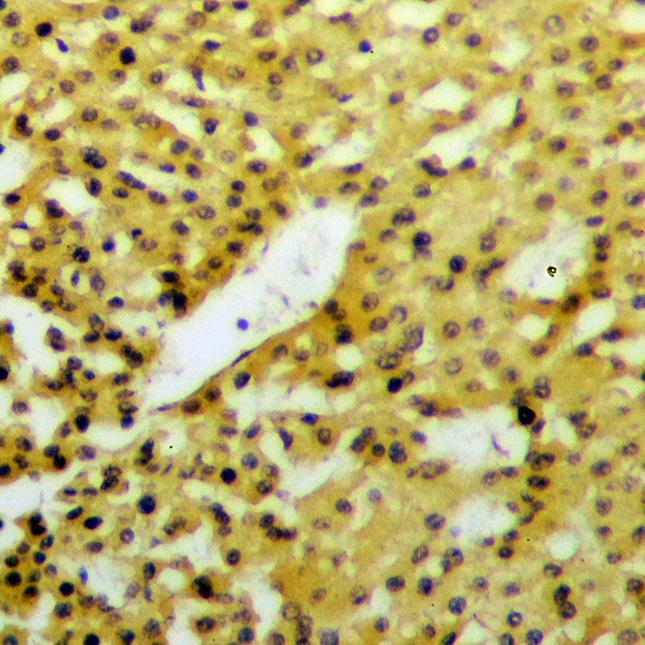Product Name :
DAPK1 (phospho-S736) polyclonal antibody Background :
DAP (death associated protein) kinase and ZIP kinase are members of a novel protein kinase family, the members of which have the capacity to mediate apoptosis through their catalytic activities. DAP kinase (DAPK) contains a “death domain” and has been shown to mediate IFN-γ-induced apoptosis. The introduction of DAPK into highly metastatic carcinoma clones lacking DAPK expression has been shown to result in the suppression of metastasis, thus linking suppression of apoptosis to metastasis. ZIP kinase contains a leucine zipper domain, which is necessary for homodimerization and for interaction with other leucine zipper proteins. ZIP kinase dimerizes with ATF-4, an ATF/CREB transcription factor family member that contains a leucine zipper. Overexpression of ZIP kinase has been shown to result in morphological changes associated with apoptosis in NIH/3T3 cells. Product :
Rabbit IgG, 1mg/ml in PBS with 0.02% sodium azide, 50% glycerol, pH7.2 Storage&Stability :
Store at 4°C short term. Aliquot and store at -20°C long term. Avoid freeze-thaw cycles. Specificity :
DAPK1 (phospho-S736) polyclonal antibody detects endogenous levels of DAPK1 protein only when phosphorylated at Ser736. Immunogen :
Synthetic phosphopeptide derived from human DAPK1 around the phosphorylation site of Ser736. Conjugate :
Unconjugated Modification :
Phosphorylation
DAPK1 (phospho-S736) polyclonal antibody Background :
DAP (death associated protein) kinase and ZIP kinase are members of a novel protein kinase family, the members of which have the capacity to mediate apoptosis through their catalytic activities. DAP kinase (DAPK) contains a “death domain” and has been shown to mediate IFN-γ-induced apoptosis. The introduction of DAPK into highly metastatic carcinoma clones lacking DAPK expression has been shown to result in the suppression of metastasis, thus linking suppression of apoptosis to metastasis. ZIP kinase contains a leucine zipper domain, which is necessary for homodimerization and for interaction with other leucine zipper proteins. ZIP kinase dimerizes with ATF-4, an ATF/CREB transcription factor family member that contains a leucine zipper. Overexpression of ZIP kinase has been shown to result in morphological changes associated with apoptosis in NIH/3T3 cells. Product :
Rabbit IgG, 1mg/ml in PBS with 0.02% sodium azide, 50% glycerol, pH7.2 Storage&Stability :
Store at 4°C short term. Aliquot and store at -20°C long term. Avoid freeze-thaw cycles. Specificity :
DAPK1 (phospho-S736) polyclonal antibody detects endogenous levels of DAPK1 protein only when phosphorylated at Ser736. Immunogen :
Synthetic phosphopeptide derived from human DAPK1 around the phosphorylation site of Ser736. Conjugate :
Unconjugated Modification :
Phosphorylation
-

-
 Immunohistochemistry (IHC) analyzes of DAPK1 (phospho-S736) polyclonal antibody in paraffin-embedded human liver cancer tissue at 1:50.
Immunohistochemistry (IHC) analyzes of DAPK1 (phospho-S736) polyclonal antibody in paraffin-embedded human liver cancer tissue at 1:50.
Bioworld Biotech only provide peptides for our antibodies and do not provide additional peptide customization services.
Price/Size :
USD 368/1mg/vial
Tips:
For phospho antibody, we provide phospho peptide(0.5mg) and non-phospho peptide(0.5mg).Describe :
Blocking peptides are peptides that bind specifically to the target antibody and block antibody binding. These peptide usually contains the epitope recognized by the antibody. Antibodies bound to the blocking peptide no longer bind to the epitope on the target protein. This mechanism is useful when non-specific binding is an issue, for example, in Western blotting (WB) and Immunohistochemistry (IHC). By comparing the staining from the blocked antibody versus the antibody alone, one can see which staining is specific; Specific binding will be absent from the western blot or IHC performed with the neutralized antibody.Formula:
Synthetic peptide was lyophilized with 100% acetonitrile and is supplied as a powder. Reconstitute with 0.1 ml DI water for a final concentration of 10 mg/ml.The purity is >90%,tested by HPLC and MS.
Storage:
The freeze-dried powder is more stable. For short time at 2-8°C. For long term storage store at -20°C.
Note :
This product is for research use only (RUO only). Not for use in diagnostic or therapeutic procedures.
 DAPK1 (phospho-S736) polyclonal antibody
DAPK1 (phospho-S736) polyclonal antibody  Datasheet
Datasheet COA
COA MSDS
MSDS SHIP
SHIP